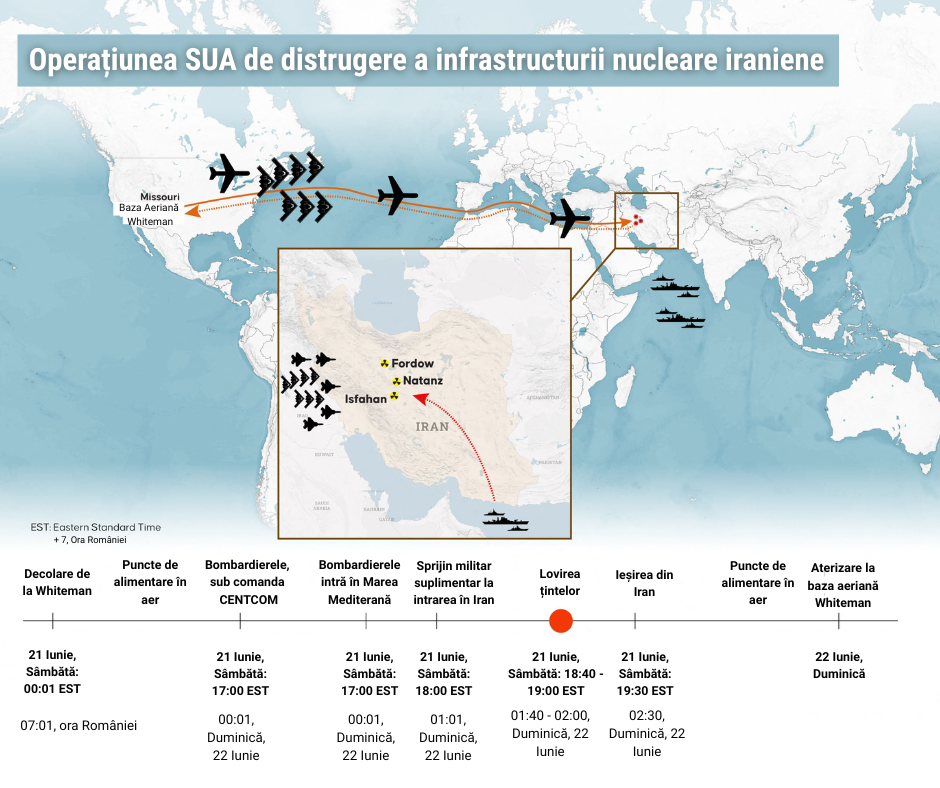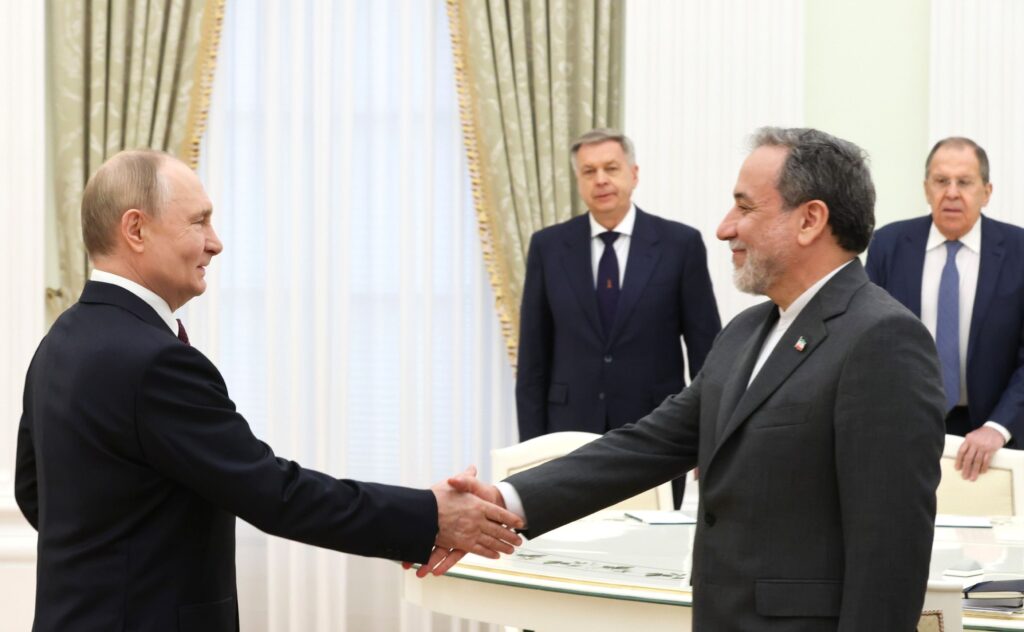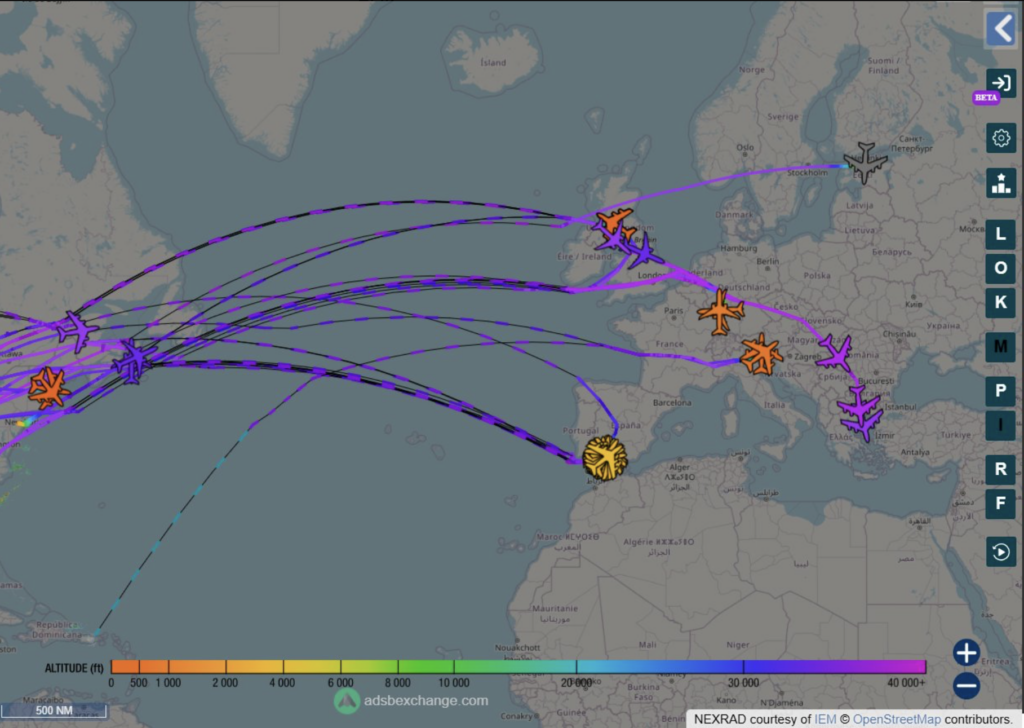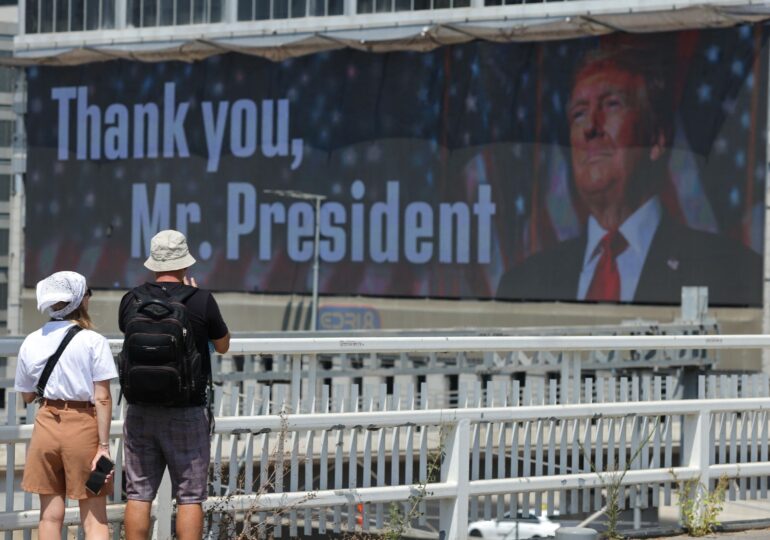Donald Trump will arrive at today’s NATO summit in The Hague, Netherlands, as a victor. The Midnight Hammer operation was a military success, although the exact extent of the damage is still unknown. Evaluation by experts indicates at least a three-year slowdown in Iran’s nuclear program, if not its total destruction.
„The Natanz nuclear facility has been completely destroyed. We are awaiting further confirmation for Fordow and Isfahan. Not because we believe something did not work, but because, naturally, it takes longer for these deep underground sites. The big question now is whether Iran’s nuclear program has regressed by a few years or if it has been completely destroyed,” stated Amit Segal, a political and military analyst from Israel, after analyzing several statements and reports.
Alongside the destruction of nuclear facilities, the Iranian fundamentalist regime is currently under immense pressure, being totally isolated, with Israel’s military forces controlling the airspace and conducting special ground operations to eliminate military leaders.
Donald Trump comes to The Hague as a victor, aware that such an operation could not have been successful without the logistical and political support of Europe.
On the evening of June 23, Iranian forces launched multiple ballistic missiles at American bases in Qatar. The airspace of this country, as well as that of Kuwait and Bahrain, was closed. Throughout Sunday, personnel from several U.S. military units in the Middle East were withdrawn.
The fundamentalist regime in Tehran reacted more to send an internal signal that it still has combat capability. Militarily, it has fewer options as long as Israel controls the airspace and conducts ground operations, resulting in the elimination of a large part of the Iranian army leadership.
"We have not aggressed anyone. And we will not accept any aggression from anyone," announced Ayatollah Ali Khamenei, the supreme religious leader, in a message to the Iranians.
7 bombers and 37 hours of flight
In the American operation to destroy Iranian nuclear facilities, seven B-2 bombers were used, flying continuously for 37 hours after taking off from Whiteman Air Force Base, Missouri. They were protected and assisted by 125 combat, refueling, and support aircraft, as well as a number of submarines that launched around 20-30 Tomahawk missiles at the nuclear centers in Natanz and Isfahan.

The bombers targeted the Fordow atomic system, built at great depth, the most important infrastructure element in the Iranian nuclear program.
The 7 bombers crossed the Atlantic Ocean, the Mediterranean Sea from west to east, and approached the targets, flying over Israel, Syria, and Saudi Arabia.
A week before the operation was launched, the U.S. sent dozens of military and refueling aircraft to air bases in Europe, which were then used to support the bomber formation's deployment.
It was a complex operation that could not have been carried out without the collaboration of NATO states and the use of American military infrastructure on the European continent, a fact that Donald Trump was well aware of.
Therefore, at the North Atlantic Alliance meeting, the main discussions will focus on increasing military spending in European countries to 5% of GDP, a figure composed of both direct investments in the defense industry and financing of infrastructure works to facilitate rapid ground-water-air troop transfers and military equipment.
This time, the requests of the American president will receive a positive response at the continental level, especially in the context of the military conflict in Ukraine, with the necessary political and public support for increasing defense spending.
The success of the American operation against Iran's nuclear facilities is likely to restore the relationship between the new American administration and the European Union, leading to the first discussions for more substantial support for Ukraine in the face of Russian aggression.
Putin, without a reaction
After the attack on Iran, the American president once again became the target of Kremlin criticism, with Russia being a direct beneficiary of arms transfers, especially drones, from Tehran.
A day before the NATO summit, Abbas Araghchi, Iran's Foreign Minister, traveled to Moscow, where he was received by Vladimir Putin.

The Russian leader did not make many promises but said he would consider how to help the regime in Tehran out of the critical situation, according to the Russian news agency, Ria Novosti.
"We have had long-standing, good, and trusting relations with Iran. We are making efforts to provide assistance to the Iranian people," stated Vladimir Putin at the meeting with Tehran's foreign diplomacy chief.
However, the Russian leader will not be able to do much, being stuck in Ukraine, a conflict in which Russia has lost around a million combatants, dead or severely wounded, and the economy has also been severely affected by the war that has been ongoing for over three years.
Until the last moment, Donald Trump kept his true intentions regarding Israel's request to use B-2 bombers, equipped with deep-penetration bunker buster munitions, to destroy nuclear centers in Iran, hidden.
Shortly before the operation was launched, the American president officially announced through the White House spokesperson that he would make a decision in the next two weeks, sparking a wave of mockery on social media towards him, being criticized for fearing important decisions.
But that was not the case. Despite risking a rupture within MAGA, many of his supporters being advocates of isolationism, and a possible reaction from Iran and terrorist networks sponsored by Tehran, Donald Trump made the decision to assist Israel in eliminating the threat of a possible nuclear attack if Tehran were to obtain the atomic bomb.
Risks for the USA and Europe
The U.S.' involvement in resolving tensions in the Middle East and the crisis following the Hamas terrorist attack on October 7, 2023, where 1,195 Israelis were killed and 250 were taken hostage, comes with certain risks for the USA and Europe, with possible retaliatory actions triggered by the regime in Tehran and the terrorist networks it has created and funded over the years.
While there is great concern about attacks on civilian populations in Europe and the USA, weakening the fundamentalist regime in Tehran was the only way to resolve the crisis in the Middle East.

Saudi Arabia and the Persian Gulf oil states did not oppose the military operations carried out by Israel and the USA in Iran.
The military and political pressure from Tehran was felt throughout the region, increasingly focused on economic development and global recognition but affected by the Iranian nuclear threat.
Israel would not have been able to act effectively against terrorist networks Hamas, Hezbollah, and the regime in Tehran if Russia had not lost all its influence in the Middle East. The new reality indicates a huge weakness of Putin, who no longer plays any role on the global stage.
The NATO summit in The Hague has the potential to become a turning point in the relationship between European leaders and Donald Trump, a relationship that has been tense and confrontational until now.
There are also good prospects for strengthening cooperation regarding support for Ukraine, as well as in deterring Iran from continuing its nuclear program and funding terrorist movements.

